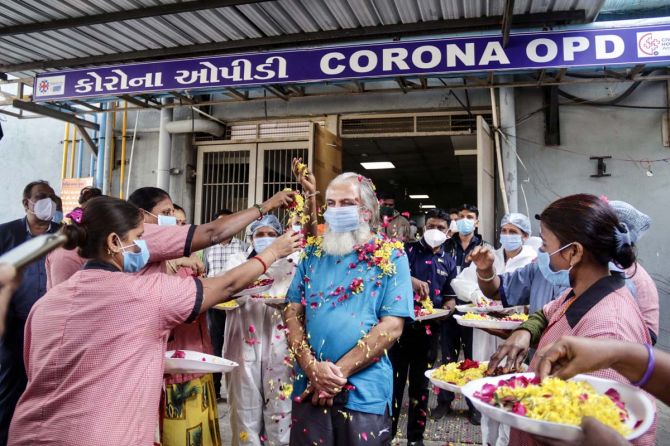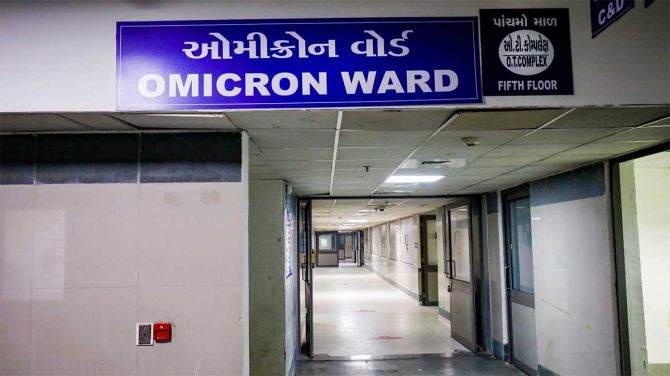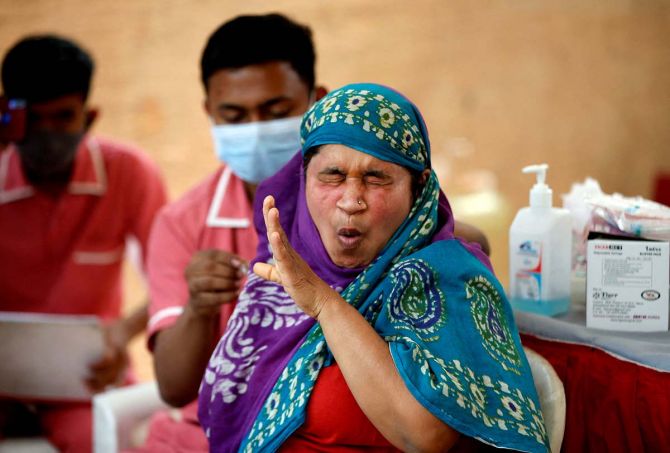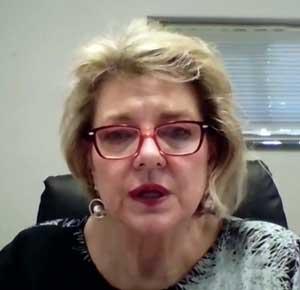'In our ICUs, the majority are unvaccinated people.'
'Out of the hospital, in the community, we see that -- whether you are vaccinated or whether you're not vaccinated -- the symptoms are more or less the same.'

South African general practitioner Dr Angelique Coetzee, 61, was the first doctor to swiftly put the world on alert, in mid-November 2021, to the rise of a possible significant new and worrying variant of the SARS-CoV-2 virus, that causes COVID-19.
In her practice in Wonderboom South, Pretoria, Dr Coetzee suddenly and very astutely observed patients coming in with a different set of clinical symptoms caused by the SARS-CoV-2 Omicron variant of COVID-19 and promptly but cautiously took action.
Her timely measures helped the world prepare for the onset of Omicron much quicker than it did for Delta.
Chairperson of the South African Medical Association, Dr Coetzee has treated over 800 COVID-19 patients, 110 of them suffering Omicron.
In the first of an exclusive two-part interview, Dr Coetzee tells Vaihayasi Pande Daniel/Rediff.com, "The symptoms are less severe. We're not saying that you're not going to get sick. If you get sick, and you get severe disease, you will get a pneumonia and you will be very sick. But the majority of people have gotten light disease or mild disease."

You are right in the middle of the Omicron situation over there in South Africa. In your view right now: What's the good news? And what's the bad news?
The good news is still that the majority of people are getting mild disease.
And the South African numbers are down this last three days -- but that can be because it's festival season and people don't go and test. But the infectivity rate is more or less the same which is 27 per cent.
The death rate is very low. And that's about the only big thing I can tell you.
We have also stopped the track and tracing of contacts, because it's not worth it. We have stopped quarantine for people who were in contact with someone who was positive.
That's where we are.
What would be the rate of vaccination in South Africa -- the percentage roughly?
Roughly about 44 per cent of the adults.
But you feel sure the Omicron situation is not as bad as it was for Delta, even though only 44 per cent adults are vaccinated in South Africa?
These are two different diseases.
For Delta, on the community level, also we saw severe cases -- a lot.
For Omicron, we don't see that lot of severe cases at the community level. So, the symptoms are less severe. We're not saying that you're not going to get sick. If you get sick, and you get severe disease, you will get a pneumonia and you will be very sick. But the majority of people have gotten light disease or mild disease.

The people who you are seeing in your practice -- who are vaccinated, either once or twice -- are definitely mostly getting light disease?
Yes. The majority.
In our ICUs, the majority are unvaccinated people.
Out of the hospital, in the community, we see that -- whether you are vaccinated or whether you're not vaccinated -- the symptoms are more or less the same.
However, the severe cases are mostly unvaccinated people.
And the severe cases are amounting only in a few deaths? Not that many deaths?
Yes. On December 24: We had 18,800 people positive out of 64,000 tested; 81 deaths and 320 people, across all facilities, hospitalised.
On the 25th we had 30 deaths 14,800 positive people.
And on the 26th we had 5,600 positive, 41 deaths and 42 hospitalised.

From a sort of commonsensical point of view -- for anybody in the world, whether it's in South Africa, whether it's in India -- it is important that we try and put off or push off, as long as possible, our exposure to any of the variants of this virus -- not get sick from them, so our immunity has a chance to get stronger and stronger.
And then when we eventually contract COVID-19, our immunity will be strong enough to deal with it well?
Yes. You will most probably only get then mild disease.
So, it's all about how long we can keep pushing off getting in contact with the COVID-19 virus. Would that be correct?
Yes.
What is important is that you need to tell your people the symptoms. If you know the symptoms, it means you know when you are sick and then you can isolate if you are sick.
But if you don't know the symptoms and if you don't know what means severe disease and if you don't know what means mild disease, then how are you going to know that you are sick?
Have you ever got COVID-19?
Me? No! Never! And I have seen so many COVID-19 patients.
You're very careful?
I follow the same (right) principles. I've been vaccinated. I wear my mask. Wash my hands. My rooms have good ventilation. I don't use the air con. I open my windows.
And the mask you wear is an N95 mask?
Only an N95 mask.
And no other protective gear. Nothing.
Wash my hands. Yes, I do exactly what I am telling my patients.
Do you meet people regularly?
I am full-time practice. Up until now I have seen 110 Omicron patients. I see patients every day. I examine them. I see them physically. They come into my consulting rooms every day, except now over the holidays, the festive season.
 IMAGE: Dr Angelique Coetzee. Photograph: ANI Photo
IMAGE: Dr Angelique Coetzee. Photograph: ANI PhotoPlease correct me if I'm wrong, but that still is quite different from meeting somebody socially, taking off your mask and eating with them? Isn't that correct?
(Tartly) I'm not stupid (laughs). I don't go meeting such people. I'm telling the people not to do that (for their protection). And I won't do it either (laughs)!
I must ask you this because people, for whatever reason, feel it is safe to socialise outside their smaller family groups and take off their masks and dine together.
I will only eat with my family who I know are vaccinated, when we are all together, that's fine. I don't have a problem with my own very close family. But you won't see me go socialising.
I will go to the shops and buy my food, but wear my mask. And, you know, our shops are very strict -- you have to put your mask on. And you have to sanitise (using sanitiser provided by the shop) when you go in.
I think the sanitising is useless. But you know what? It will help some other people. That's what we do. They are very strict in South Africa, in the shopping centres and in the malls with this. They are very strict.
Why do you feel sanitising is useless?
How do I know what is in that sanitiser. Is it 70 per cent alcohol?!
I just say yes and use it -- it's fine with me. But if in the surgery (in her consulting rooms) I really touch people, I use the correct things to sterilise afterwards.
Feature Presentation: Ashish Narsale/Rediff.com











 © 2025
© 2025